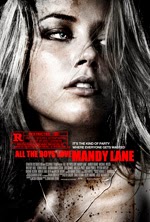"You're not
afraid of the dark, are you?"
Before he became Dominic Toretto, Vin Diesel was Richard B.
Riddick, an escaped convict with special eyes that allowed him to see in the
dark. The anti-hero was introduced in Pitch
Black, an effective B-movie where Riddick and a motley group of survivors
fought for their lives on a desert planet. Pitch
Black was enough of a hit that Diesel took a larger role in crafting more
of the character's backstory. The result was The Chronicles of Riddick, a gothic space opera with five times the
budget of its predecessor. Diesel obviously dipped into his experience playing Dungeons & Dragons to turn Riddick
into the last remaining member of a warrior species known as the Furyans. The
bloated mythology introduced Elementals, Necromongers, and the Underverse to
deaf ears as "Chronicles" became a critical and commercial failure.
Riddick was put on the shelf, but Diesel believed in the
property enough that he negotiated for the rights from Universal in exchange for
a cameo in The Fast & Furious: Tokyo
Drift. Diesel's passion was such that he mortgaged his home to help raise
the money needed to complete the third film, simply titled Riddick.
Riddick ditches the elaborate fantasy elements and returns
to his roots as a badass killing machine. In a nod to King Conan, Riddick has
grown weary of the throne as Lord Marshall of the Necromongers. Betrayed by the
ambitious Lord Vaako (Karl Urban), Riddick is stranded once again on a desolate
planet populated by a vicious menagerie of beasts.
The first act of Riddick
resembles a Heavy Metal version of Wall-E with Riddick raising some sort of
Doberman-hyena hybrid while battling H.R. Giger-inspired scorpions. Riddick
fights his way across the wastelands to a remote outpost in order to activate a
distress beacon. The signal alerts two rival teams of mercenaries looking to
cash in on the substantial bounty on Riddick's head. There's a skuzzy, patchwork team headed up by
Santana (Jordi Mollá) and muscle-bound Diaz (WWE's Dave Batista) and a sleek,
militaristic unit led by Boss Johns (Matthew Nable) and sexy sniper Dahl (Katee
Sackhoff). At this point, Riddick plays
out like a horror film with the mercs being picked off one by one by a killer
hiding in the shadows. Once the third act rolls around, the movie becomes a redo
of Pitch Black as Riddick and his
adversaries are forced to join forces in order to escape.
You get exactly what's advertised with Riddick. Writer/Director David Twohy offers up a straightforward action
flick with Diesel growling in that deep, booming voice of his. There's not much
in the way of subtlety here. Twohy establishes Santana as a sadistic scumbag by
having him shoot a female prisoner (pop singer Keri Hilson) in the back as she flees.
Don't worry the bad guy gets what's coming to him in the form of the grisliest
decapitation outside of a Takashi Miike picture. It's also difficult to take
the filmmakers' attempts at presenting a strong female character in Dahl seriously
when she gratuitously appears in topless or when Riddick charmingly offers to
go "balls deep" on her. Thankfully, Sackhoff's performance is good
enough to crawl out from underneath such crude material.
Riddick is a
marked improvement over the second installment and certainly more enjoyable
than some of this summer's bloated blockbusters (The Lone Ranger, R.I.P.D.),
It won't be considered classic cinema, but fans of Riddick and Vin Diesel will
be satisfied.
Rating: ** (*****)






